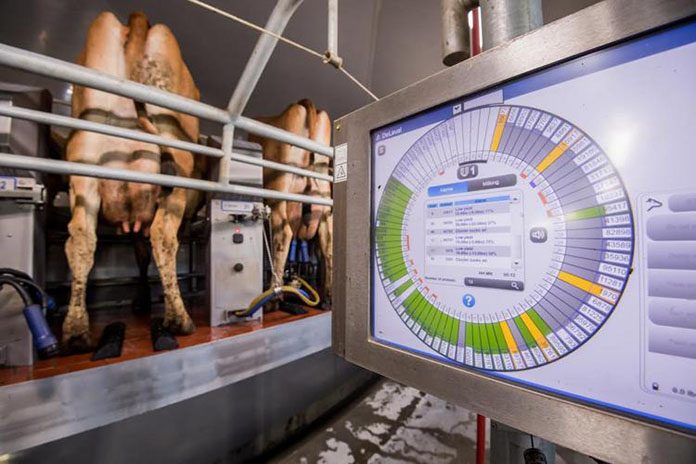
Eight minutes. That’s how long it takes to milk a cow at Threemile Canyon Farms in Boardman, according to Adlai Schuler, the farms’ veterinarian and livestock operations manager.
From those eight minutes, a cow produces an average of 36.5 pounds or 4.25 gallons of milk, and each Threemile Canyon dairy cow gets milked every 12 hours. When you factor that in with about 35,000 (predominantly) Jersey cows undergoing this routine daily, that’s more than 2.5 million pounds or approximately 297,000 gallons of milk.
Threemile Canyon Farms achieves this staggering feat every 24 hours thanks to robotic milking rotaries or carousels.
“So for our cow, she’ll step on the on the carousel, and it’ll take her eight minutes to get milked,” Schuler said. “I haven’t done it for a very long time, but if I were to hand milk a cow today, that’s going to be a 40-minute process for me.”
According to its website, Threemile Canyon Farms’ 180-acre dairy operation is in the center of its 93,000-acre complex. Round-the-clock milking occurs at three milking parlors, Schuler said, with each parlor containing two DeLaval Dairy Service carousels that each hold 80 cows.
“We have three people per carousel, and we have six carousels,” he said. “So our robotic milkers are exactly what it sounds like … our cows step onto a carousel and the first point of contact is with a robot that will go in and clean any debris off of the teats and apply a disinfectant. The robot’s doing that.”
From there, Schuler said, the cows move to a technician who stands next to the carousel and wipes off any remaining debris from the teats and ensures the udders are dry.
“The cow will continue to go around the carousel, where a second technician is going to put a milk harvesting machine on the cow. That would be like any milking machine that you’re going to see throughout the world,” he said. “And then we have another technician move back and forth between, making sure that everything’s running the way that it should.”
The milking machine will harvest as the cow goes around the carousel, Schuler said, and when the cow is milked, the machine automatically detaches before another robot disinfects the cow again.
“From a cow-cleaning standpoint and a cow-comfort standpoint, they are a really good tool,” he said.
The milking parlors also have automated clean-in-place processes that operate several times a day, allowing each parlor to milk roughly 11,000 cows.
“Eventually we get to a point where we’ve got all 35,000 cows milked twice in a 24-hour period,” Schuler said.
According to the website, Threemile Canyon’s parlors “blend high efficiency and humane treatment” of the herd. “If you watch our cows, they are ready to get on the wheel, and they’re excited about that process,” Schuler said.
To run the operation’s data-driven system, he said, Threemile Canyon uses computers in its parlors.
“That means that all of our processes are controlled through the use of automation, as much of it as we can,” he said, “and that we’re going to utilize the data that’s there, or the data that those computers can generate, and make sure that we are not only performing, but that we’re performing as efficiently and effectively as we can for both the cow and our people.”
Once cows are milked, milk flows to silos that each hold 75,000 pounds or 10,000 gallons of milk. It’s held there and tested before being taken to a processing facility in Boardman.
“And every load of milk that leaves our facility, before it can leave, we get bacteria and milk quality counts,” Schuler said. “And it’s checked for antibiotics and (we) make sure that it’s at the appropriate temperature for us to ship. We’re making sure that our milk is of the highest quality.”
According to its website, Threemile Canyon Farms’ cows are not injected with any artificial growth hormones to increase milk production.
“Once it’s processed, it’s then sent to Tillamook County Creamery Association in Tillamook,” Schuler said. “We market all of our milk to Tillamook.”
Threemile Canyon Farms began using the robotic carousels in 2017 after retrofitting its dairy parlors to accommodate them, he said.
“It’s been an ongoing process,” Schuler said. “So we’re always trying to update, stay current with what our cows need us to do.”
Schuler added the carousels didn’t increase the number of cows being milked but did help with milking efficiency and job creation.
“I think as we looked at other industries and saw the benefits of automation, it was something that we thought was coming and wanting to be on the front edge of what dairying looks like,” he said. “It’s helped with consistency. It helps our employees see what’s possible and what the future is, and it’s helped us open up jobs for different types of skilled labor.”
Some of those jobs include the carousels’ maintenance department of mechanics, electricians and software engineers.
Schuler said as technology changes, Threemile Canyons Farms continues to seek technological improvements to increase agricultural efficiency.
“That is one of our core goals. As we look to the future, it’s data automation and genetics,” he said. “And we want to be on the front end of what’s best for the cow, and, and what’s best for our team. And so that’s an everyday conversation. And we’re taking ideas from all over our industry, as well as from our people, and then saying, ‘what do the cows need us to do that’s best for them?’ ”








